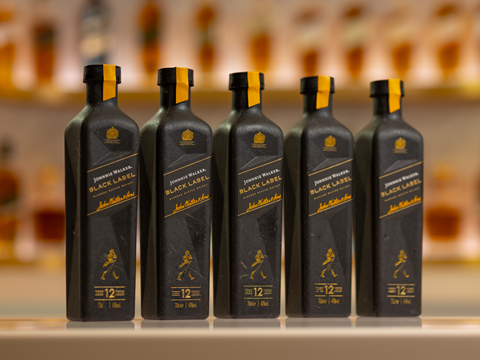
Diageo and PA Consulting are trialling a 90% paper-based bottle for its Johnnie Walker Black Label scotch whisky, suggesting that it could emit 47% less carbon than standard glass solutions.
From 25th September until mid-October, the trial will take place exclusively at Johnnie Walker Princes Street’s 1820 in Edinburgh. Bartenders will serve drinks from 250 70cl bottles to test their feasibility in a bar environment; consumers will be able to see the bottles, but not purchase them.
An external life cycle analysis claims that the prototype could reduce carbon emissions by 47% compared to the glass Johnnie Walker Black Label equivalent. It also claims to be approximately 60% lighter.
Inside the bottle is a ‘very thin’ plastic liner that, according to PA Consulting, does not impact the bottle’s recyclability, as it is not attached or bonded to the Dry Molded Fiber outer layer. Therefore, it does not require separation before the components are recycled.
PulPac, Setop DIAM, and PA Consulting worked with Diageo to produce the bottle closure, which is made from a combination of cork and similar Dry Molded Fiber paper technology to the bottle itself; however, it is excluded from calculations and only intended for use during the trial.
The stopper used in the trial is not recyclable, but alternative solutions are reportedly in development.
As a whole, the bottle’s design maintains the same square shape as previous Johnnie Walker Black Label bottles, yet cuts unique facets into the sides and embosses the company’s Striding Man iconography onto the bottle and closure.
This trial takes place as part of the Bottle Collective with PA and PulPac. As the paper-based bottle is trialled and developed further, the partners plan to consider future improvements to its recyclability.
Jennifer English, Johnnie Walker’s global brand director, comments: “We are constantly pushing the boundaries of innovation to not only deliver the premium quality and iconic design our customers expect from us, but to do so in a way that reflects our sustainability ambitions.”
“The paper-based bottle trial for Johnnie Walker Black Label marks a significant step forward in our journey. This test allows us to explore new packaging in the high intensity environment of the on-trade. We are pioneering new packaging solutions and shaping the future of the industry.”
“PA is delighted to have worked with Diageo and PulPac to produce these paper-based bottles for Johnnie Walker Black Label,” adds Jamie Stone, design and innovation expert at PA Consulting. “These bottles break new ground in packaging design and shows the potential to significantly reduce carbon emissions, whilst seeking to maintain the elegance, luxury, and bottle size expected in the premium drinks market.
“PulPac’s Dry Molded Fiber technology opens up new possibilities for cost-effective, lightweight, less carbon intensive and more sustainable packaging. We look forward to collecting feedback from bartenders and the public following the market trial, so we can test and refine the bottle and technology further.”
A previous trial saw Diageo and PA Consulting work together to trial paper-based packaging for Baileys’ Original Irish Cream Liqueur. Designed for recycling in standard paper streams, the 80ml bottles were served at Time Out Festival in Barcelona, Spain; the design team have used the learnings from this trial to inform the technical aspects of a larger, more complex bottle shape for Johnnie Walker.
We interviewed spokespeople from PA Consulting and Diageo to dig into the details of the project, gauge the potential for a commercial launch in future, and discuss the controversy surrounding paper-based bottles.
Johnnie Walker has also unveiled its Blue Label Ultra bottle, which is the brand’s lightest 70cl scotch whisky glass bottle and could potentially be the lightest in the world. The company aspires to reduce the weight of its glass packaging and lower its packaging-related carbon emissions.
If you liked this story, you might also enjoy:
The ultimate guide to the Packaging and Packaging Waste Regulation in 2024
How are the top brands progressing on packaging sustainability?
Sustainable Innovation Report 2024: Current trends and future priorities
Everything you need to know about global plastic sustainability regulation













No comments yet